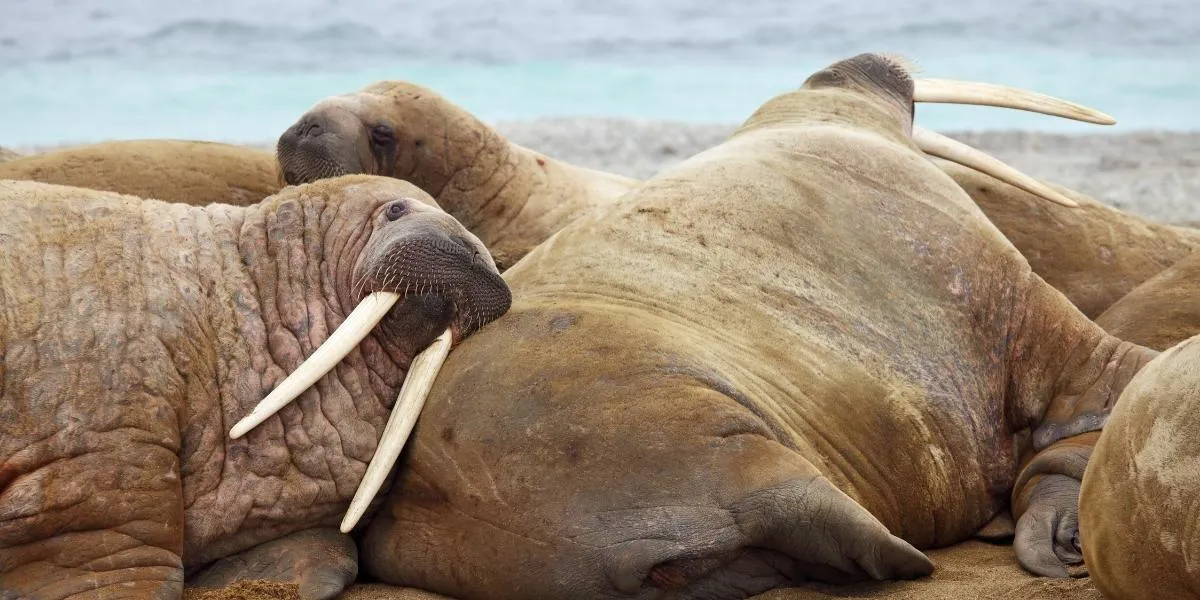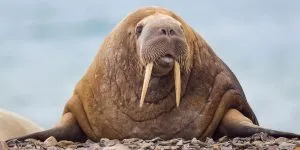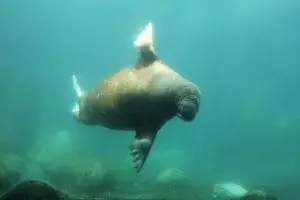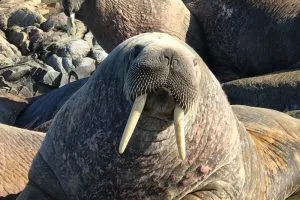Walruses are easily distinguished from other marine mammals because of their long tusks and large body size. Despite this, and being around the top of their food chain, walruses still do have some natural predators. What animals could go face to face with the “fearless” walrus?
The main natural predator of the walrus is polar bears. Walruses are also sometimes hunted by whales such as the orca. Another large threat to walruses is humans. You may be surprised to hear that walrus use their tusks more for defensive reasons, rather than for hunting.
Keep on reading to find out more about the dangers posed to walruses, and how they react in these situations.
What Are the Natural Predators of a Walrus?
Walruses do not have many predators. Due to the large size of a walrus, it is often not worth the energy to fight a walrus. However, when food is scarce, there are a couple of marine mammals which are brave and strong enough to hunt a walrus1 (source: B.A. Zenkovich, About the Killer Whale, 1938, pp.109–112).
1. Polar Bears
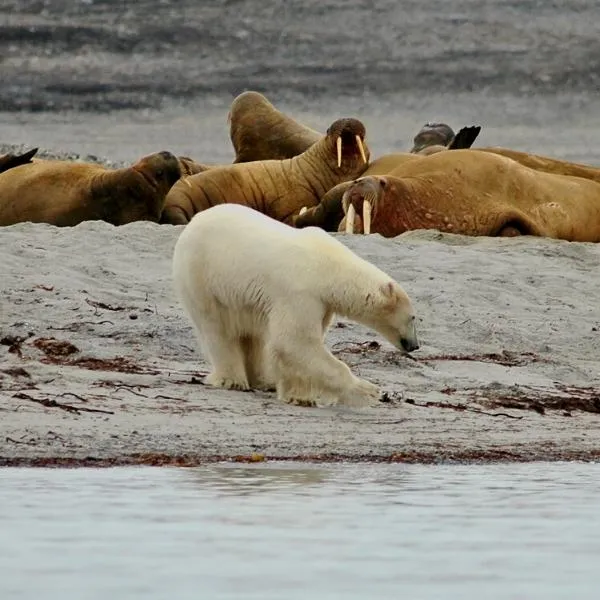
Polar bears are natural predators of walruses. When polar bears hunt walruses, they often target the young calves or injured adults. There have also been observations of a polar bear that has hunted a healthy adult walrus2 (sources: Arctic Museum & Arctic Studies Center, Bowdoin College and The Polar Bear Programme).
The relationship between polar bears and walruses is a typical predator-prey relationship. This means that walruses have been observed to be frightened and anxious if a polar bear is present.
As a result, walruses often retreat if they spot a polar bear around their herd. This means that a walrus retreats into the water, where it can move quicker than the polar bear 3(sources: Arctic Museum & Arctic Studies Center, Bowdoin College and BBC World).
Sometimes, a walrus has no other option than to defend itself physically against a polar bear. In the circumstance where the polar bear does not kill the walruses, the polar bear can retreat. This explains why some polar bears have been seen with injuries caused by tusks4 (source: Arctic Museum & Arctic Studies Center, Bowdoin College).
Polar bears acknowledge the high risk of fighting walruses. The dangers posed by walrus tusks encourage polar bears to use tools in their fight – polar bears can use stones or blocks of ice to hit the walruses head with5 (source: I. Stirling, et al, Arctic, Vol. 74, No. 2, pp.113-238, 2021). It is also a large time commitment for a single polar bear to bite through the blubber of a single walrus6 (source: E. Tschida, Guidelines and Other Tips for Excelling at a Marine Mammal Internship, 2005). Numerous polar bears can feed on a single walrus carcass7 (source: B.A. Zenkovich, About the Killer Whale, 1938, pp.109–112).
2. Whales
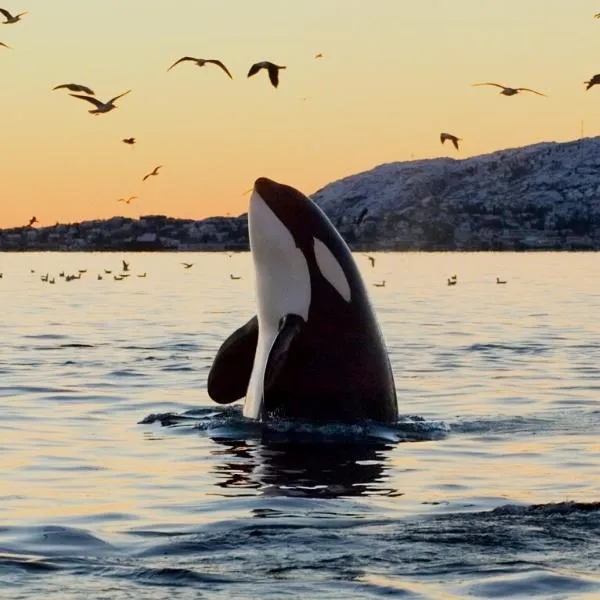
Some whales hunt walruses, too. For example, the orca (also known as a killer whale) has been observed to hunt walruses in groups. These hunts can occur both in inshore waters and the deep sea8 (source: N. Kryukova, Biology Bulletin, Vol. 39, No.9, 2012). The hunt of walruses by killer whales is intentional.
Researchers observed orcas hunting walruses in 2008 and detailed their findings in Biology Bulletin. During the hunt, the orcas attacked the whole group of walruses before picking out an injured adult or calf as their target. They made as many as 55 attacks on the target during 17 minutes, although the hunt was ultimately unsuccessful in this instance.
You may be surprised to hear that the orcas did not end their pursuit when the walruses retreated to land. They began jumping out of the water and breaching the shore whilst the walruses were resting. This prevented the walruses from escaping into the sea.
Enjoying earning about walruses? See our full walrus facts article for more interesting information, including why they have tusks and mustaches.
Do Humans Hunt Walrus?
Yes, walruses are hunted by humans. Walruses have been hunted since at least the tenth century. At first, walruses were hunted by Inuit countries in the Arctic region for subsistence; this includes eating.
The valuable parts of the walrus are their blubber, hide, skulls and tusks (ivory). One of the usages for tusks is to carve artwork into them. Countries in Europe and Asia popularised this and encouraged commercial hunting.
The trade also became very profitable when elephant tusks became scarcer. This led to the overexploitation of walrus populations and determined both the settlement and abandonment of Greenland.
The hunt for walruses continues to date, particularly by Alaskan Inuits who can still legally sell walrus ivory within the US9 (source: CAMEO). However, walruses can be dangerous and attacks have been documented by the Inuit community and Arctic explorers10 (source: Wikipedia).
How Do Walrus Protect Themselves From Predators?
Walruses protect themselves from predators using their tusks. Although their tusks are enlarged canine teeth, walruses use their tusks for more defensive purposes, rather than for hunting animals. For example, female walruses use their tusks to defend their calves11 (source: I. Stirling, et al, Arctic, Vol. 74, No. 2, pp.113-238, 2021).
Walruses use their tusks as protection both physically and visually. The primary use of the tusks is to use them as a visual threat display, to discourage any predators12 (source: J.G. MacCracken and R.B. Benter, Marine Mammal Science, Vol. 32, Issue 2, pp.588-601, 2016).
However, sometimes conflict is unavoidable, and predators can be impaled by the tusks in a fight.
Want to learn more? We have put together a full article with everything you need to know about walrus tusks.
How Long Do Walrus Live?
Walruses can live up to the age of 40 years old. We can determine the age of a walrus by analyzing one of its teeth. This is possible because growth layers are produced as the walrus ages13 (source: Seaworld).
Read more about the life span of a walrus here.
Related Questions
Do Sharks Eat Walrus?
No, sharks generally do not eat walruses. However, it is possible for Greenland sharks to eat walruses. Also, Eskimos have observed walruses eating Greenland sharks. This is likely not a common occurrence14 (source: F.H. Fay and J.J. Burns,Arctic, Vol. 41 No. 3, pp.167–259, 1988).
Do Polar Bears Eat Walrus?
Yes, polar bears do eat walruses. Polar bears tend to hunt polar bears if there are few other food options. This means that walruses are not the main part of the polar bears’ diet.
When polar bears hunt walruses, they target short young walruses, or injured adult ones. There have also been observations of a walrus that has hunted an adult walrus15 (sources: Arctic Museum & Arctic Studies Center, Bowdoin College, BBC World, and I. Stirling, et al, Arctic, Vol. 74, No. 2, pp.113-238, 2021).
Do Whales Eat Walrus?
No, most whales do not eat walruses. However, some whales are carnivorous, and walruses are their prey in some regions. Orca whales have been observed to actively hunt walruses. Orcas hunt walruses both in the deep sea and inshore waters (10; 12; 13)16(source: N. Kryukova, Biology Bulletin, Vol. 39, No.9, 2012)(source: Seaworld).
However, one video-recorded example of orcas hunting walruses suggests that it was a training session for young orcas: no walruses were immediately killed17 (source: N. Kryukova, Biology Bulletin, Vol. 39, No.9, 2012).
Do Dolphins Eat Walrus?
No, dolphins generally do not eat walruses. As dolphins are carnivorous, it is possible for a dolphin to eat a walrus – perhaps a carcass – however, this is not the main food source for them18 (source: R.A. Kastelein, Encyclopedia of Marine Mammals (2nd ed), pp.1212-1217, 2009).
What Are Other Causes of Death for Walrus?
As well as predators, walruses can die due to conflict with other walruses. When adult walruses fight, sometimes one of them can be killed: conflict can occur over territory or mating partners. Young walruses can die from being crushed during stampedes19 (source: Seaworld). Stampedes occur as herds of walruses can be frightened by the presence of predators20 (source: Center for Biological Diversity, Pacific Walrus).


